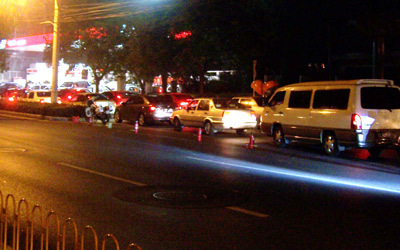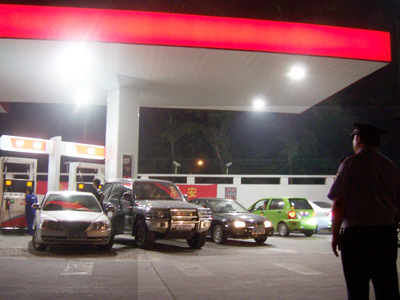China's top economic planner announced Thursday night the country will raise the prices of gasoline, diesel oil, aviation kerosene and electricity, revealing an unprecedented broad plan to raise energy prices.
Beginning Friday, the benchmark gasoline and diesel oil retail prices will be marked up by 1,000 yuan (US$144.9) per tonne, with the price of aviation kerosene up by 1,500 yuan per tonne.
The prices of natural gas and liquefied petroleum gas, however, would be left unchanged, according to the National Development and Reform Commission (NDRC).
The benchmark retail prices of gasoline and diesel oil would be lifted to 6,980 yuan and 6,520 yuan per tonne, up more than 16 percent and 18 percent respectively.
The price rises also translate into mark-ups of 0.8 yuan and 0.92 yuan per liter, the measurement used at service stations in China, for gasoline and diesel oil respectively.
The commission said the oil price adjustment was made to ensure supplies in the country by diminishing the gap between continuously rising international crude prices, especially since February, and state-set domestic oil prices.
Crude oil price on the international market reached above US$136 per barrel on Wednesday, up more than 45 percent from the price when the country raised oil prices in November last year.
The government-controlled oil prices on domestic market should be blamed for a shortfall of supplies, as some refineries stopped or cut back on processing to avoid losses, said an unidentified NDRC official.
The commission said more subsidies would be offered to farmers, public transport, low-income families and taxi drivers to cushion the crunch of price rises.
For instance, farmers would get five yuan per mu (1/15 hectare) of farmland in extra subsidy; low-income families in cities would get an extra 15 yuan for each person every month starting from July, 10 yuan for such rural families.
The commission said fares for passenger travel by rail, urban and rural public transport and taxis would remain unchanged after the rise.
The official did not comment on the impact of oil price rises on the inflation rate, which eased to 7.7 percent in May. In April, it rose 8.5 percent after a 12-year high of 8.7 percent in February.
The commission also said the average electricity tariff will be raised by 2.5 fen (1 fen=0.01 yuan) per kwh starting from July 1, up 4.7 percent on average.
It said the price rise was made in response to rising costs of the country's power plants, including rising power-coal prices, increased costs on desulphuration facilities and investment in grid upgrading.
More than 80 percent of all the power generation companies suffered losses in the January-May period due to power-coal price rises.
Official statistics showed that power coal prices went up by more than 80 yuan per tonne in the past two years. The prices had gone up by 60 yuan since the beginning of the year.
The commission also announced the country would exercise temporary price intervention on power coal as of Dec. 31, and power coal prices are capped below the price on June 19.
The policy was adopted as the commission expected the power-coal price to rise further because of the gap between domestic and international prices and tight supplies.
The commission also said urban and rural residents and sectors of farming and fertilizer production, as well as the quake-hit provinces of Sichuan, Shaanxi and Gansu, will be exempt from the price rise.
Industrial and commercial undertakings, however, would only see limited impact, as power expenses usually account for a small portion of their total costs, it said.
"The price rise in electricity would not have a fundamental impact on the country's inflation rate," said the NDRC official.
 Cars queuing near a gas station on the Zhanlan Road in western Beijing on Thursday night.
Cars queuing near a gas station on the Zhanlan Road in western Beijing on Thursday night.

Many drivers refueled their cars at a gas station on late Thursday night on the Zhanlan Road in western Beijing after hearing about the price hike of gasoline. A policeman was maintaining the order.
At around 11 PM on?Thursday at a gas station on the Zhanlan Road in western Beijing, an official with the Beijing Municipal Development and Reform Commission, apparently unaware of the price hike, said she was sent to “observe the situation at the gas station”.
(China.org.cn, Xinhua News Agency June 19, 2008)